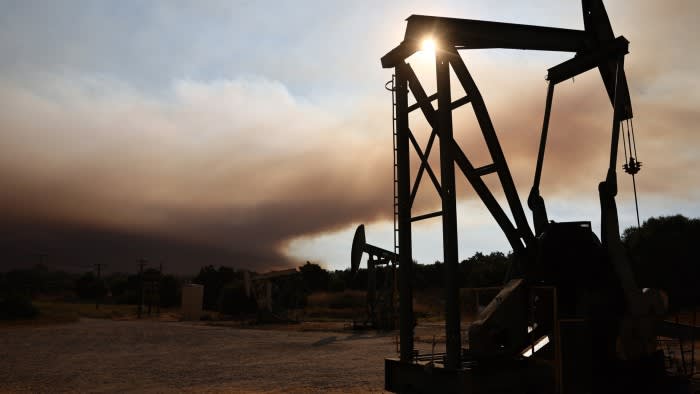Unlock the Editor’s Digest for free
Roula Khalaf, Editor of the FT, selects her favourite stories in this weekly newsletter.
BP has raised its forecasts for oil and gas demand in the latest sign that the transition to clean energy has slowed.
The oil major made the projections in its closely watched annual outlook as renewable power sources such as wind and solar fail to increase at a fast enough pace to keep up with the growth in global energy demand.
BP warned that delaying the clean power transition could be “costly” as it said oil would continue to “play a significant role in the global energy system for the next 10-15 years”.
The report showed oil demand would be about 97.8mn barrels per day in 2035 under BP’s scenario that captures the current trajectory of the global energy system.
This is up more than 5 per cent compared with last year’s projection when BP slashed its growth forecasts for both oil and gas.
When net zero targets — the reduction of CO₂ emissions by about 95 per cent from current levels — are factored into calculations, the projection for oil demand is 80.2mn b/d in 2035, up 10 per cent on last year’s forecast.
The oil demand projection is 76.8mn b/d by 2050 in the current trajectory, according to the outlook, compared with last year’s figure of 73mn b/d.
The world currently consumes about 100mn b/d of oil.
BP’s forecast for natural gas demand for 2035 under the current trajectory was 3 per cent higher compared with last year.
The oil demand projection for 2030 was last raised in 2022, while gas was raised back in 2018.
The group’s forecasts for CO₂ emissions are also higher than last year’s projection, but despite the greater projected demand for fossil fuels, emission levels end up lower by 2050 under both the current trajectory and when net zero is accounted for.
The company stressed the predictions were not what is likely to happen but instead explored “the possible implications of different judgments and assumptions concerning the nature of the energy transition”.

While no direct reason for the upward swing in the oil and gas demand forecasts were given in the report, it noted that under the current trajectory, the decline in the use of oil in road transport is offset by the increasing use of oil in the petrochemicals industry.
The report added that in emerging economies, “increasing levels of prosperity and rising living standards” support a more resilient demand for oil.
The world was in an “energy addition phase” where the consumption of both low-carbon energy such as renewables and fossil fuels was increasing, said Spencer Dale, BP’s chief economist.
The challenge is to move to a phase in which “low-carbon energy increases sufficiently quickly to more than match the increase in global energy demand, allowing the consumption of fossil fuels and carbon emissions to decline”, he said.


